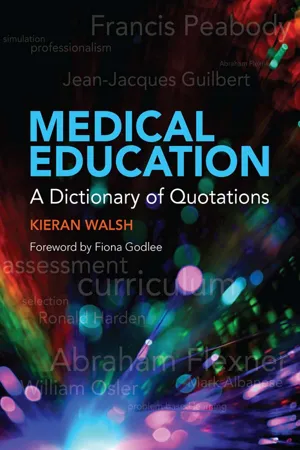1. CURRICULUM DEVELOPMENT
In 1987 and again in 1988 the General Medical Council (GMC) education committee reported that British medical schools were having difficulty in achieving their educational objectives. (The claim that medical schools actually had educational objectives came as a considerable surprise to many working within them.)
Robin Fraser
For two generations we have been loading and loading this brief curriculum as if we desired to teach many things ill rather than a few things well.
Thomas Clifford Allbutt
Allbutt TC. An address on medical education in London: delivered at King’s College Hospital on October 3rd, 1905, at the opening of the medical session. BMJ. 1905; 2(2337): 913–18.
Although there is no reason to suppose that learner-centred teaching cannot occur in a curriculum-based teaching programme, there is a tendency for the curriculum to influence how things are taught in that it may structure teaching to ‘chosen’ areas and so may lead to convergent thinking’ rather than true exploration and learner centredness.
Tahir Awan
Awan T. Structured, curriculum-based group teaching or unstructured, learner-centred group approaches? Educ Prim Care. 2009; 20(6): 462–7.
Any curriculum plan which disregards the nature of learning, and of the learners, is bound to be ineffective.
Raja Bandaranayake
Bandaranayake RC. How to plan a medical curriculum. Med Teach. 1985; 7(1): 7–13.
Time may be gained by the simple and common-sense process of striking out of the curriculum teaching that oppresses and bewilders the student, that distracts his attention from the real object of his study, that loads his memory without training his intellect.
Robert Barnes
Barnes R. An address on obstetric medicine and its position in medical education. BMJ. 1875; 2(758): 33–5.
What applies to the design of the curriculum as a whole applies to the individual studies.
W Gordon Byers
Byers WG. The place of ophthalmology in the undergraduate medical curriculum. BMJ. 1922; 2(3209): 4–6.
I would suggest that, as the majority of us are destined to be general practitioners, general practitioners of good standing should be well represented on our teaching bodies, and the advantage of their experience be applied to the curriculum.
Ernest Carmody
Carmody EP. Education for general practice. BMJ. 1932; 2(3734): 224–5.
At present there is no method. The curriculum is the accidental result of multiple collisions between vested interests in a variety of departments, held in check by the inertia of tradition.
Bruce Charlton
Charlton BG. Practical reform of preclinical education: core curriculum and science projects. Med Teach. 1991; 13(1): 21–8.
Reforms such as increasing generalist training, increasing ambulatory care exposure, providing social science courses, teaching lifelong and self-learning skills, rewarding teaching, clarifying the school mission, and centralizing curriculum control have appeared almost continuously since 1910.
Nicholas Christakis
Christakis NA. The similarity and frequency of proposals to reform US medical education: constant concerns. JAMA. 1995; 274(9): 706–11.
I think that the emphasis laid on the division of the curriculum into pre-clinical and clinical is unfortunate. The division is perhaps convenient in many ways, but it is wholly artificial and educationally unsound.
GA Clark
Clark GA. The medical curriculum. BMJ. 1942; 2(4260): 259.
The various subjects of the curriculum have developed as autonomous independent compartments of knowledge; yet for medical education they must be viewed primarily as different facets of the same subject.
Henry Cohen
Cohen H. Medicine, science, and humanism. BMJ. 1950; 2(4672): 179–84.
The Malthusian problem for the curriculum is that the length of the curriculum is fixed (or can grow by only slight linear increments) while the subject matter it could cover grows exponentially.
Ken Cox
Cox K. Knowledge which cannot be used is useless. Med Teach. 1987; 9(2): 145–54.
To incorporate special study with general medical education is, therefore, to do injustice to both; for general medical education, which already fully occupies the time set apart for it, must be detrimentally curtailed or compressed to make room for the special study; and the special study cannot be advantageously carried on while the foundations on which it ought to rest have not been wholly laid down nor thoroughly consolidated.
James Crichton Browne
Crichton Browne J. The address delivered in the section of psychology. BMJ. 1880; 2(1024): 262–7.
If it is this “Jack-of-all-trades” that is wanted, let us by all means go on as we are doing, adding another year to the curriculum every now and again.
Hugh Crichton-Miller
Crichton-Miller H. “The student in irons”. BMJ. 1932; 1(3718): 680–1.
Now, the average student is a gentleman admitted to society; drinking, card-playing, and midnight rioting, are no longer essentials in his curriculum; frequently he has secured for himself the status of graduate or undergraduate of a university; more often he has been reared in a public school, and entering upon his technical education with all the rawness and inexperience of a schoolboy, has nevertheless an intellect prepared for theoretical instruction.
Edward Crossman
Crossman E. An address on the maintenance of the honour and respectability of the medical profession. BMJ. 1883; 2(1176): 61–7.
Will the [Edinburgh] declaration change medical education? Anyone familiar with the kind of wranglings that precede the transfer of even a week of curricular time in an established medical school will not be optimistic.
Colin Currie
Currie C. Global village fête. BMJ. 1988; 297(6648): 630.
There is abundant justification, however, for the plea that the real object of the medical curriculum, perhaps more than of any other educational discipline, should be to train the student to observe, to think, and to form a reasoned judgement, and not to make confused and evanescent records on his memory.
Henry Dale
Dale H. An address on the relation of physiology to medicine, in research and education. BMJ. 1932; 2(3753): 1043–6.
The expansion of knowledge is also not a new problem. Medical curricula of 100 years ago also lamented that five years was not long enough to learn all that is needed.
Matt Doogue
Doogue M. Debunking one myth and perpetuating another. BMJ. 2002...
